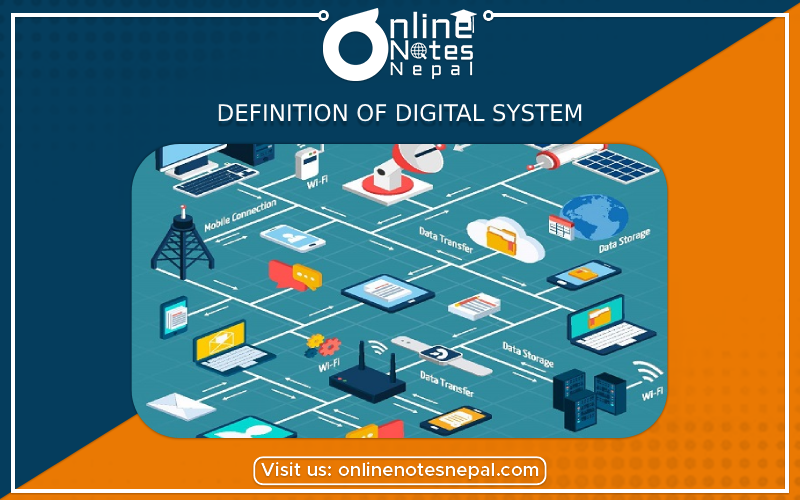Published by: Dikshya
Published date: 09 Jul 2023

- A digital system refers to a system that processes, stores, and communicates information using discrete (digital) signals or symbols. It operates on digital data represented as binary digits (bits), which are typically 0s and 1s. In a digital system, the input, output, and internal operations are represented and manipulated using binary numbers. The system uses electronic components, such as logic gates, registers, memory elements, and microprocessors, to perform various functions, including computation, storage, control, and communication.
- Digital systems are designed to perform specific tasks or functions based on predefined rules, algorithms, or instructions. They can process data with high accuracy and reliability, and they can be programmed and reprogrammed to perform different tasks or adapt to changing conditions.
Some common examples of digital systems include:
1. Digital Computers: Personal computers, laptops, servers, and other computing devices that process and store information using digital signals.
2. Digital Communication Systems: Mobile phones, the internet, digital television, and other communication systems that transmit and receive digital signals for data transfer.
3. Digital Audio and Video Systems: Digital audio players, digital cameras, and high-definition televisions that capture, store, and reproduce digital audio and video signals.
4. Digital Control Systems: Industrial automation systems, robotic systems, and embedded systems that use digital signals to control and monitor processes.
Advantages of digital systems include their ability to accurately process and store information, resistance to noise and distortion, ease of replication and distribution, and compatibility with other digital systems. They have become integral to modern technology and are widely used in various domains, including telecommunications, entertainment, healthcare, transportation, and manufacturing.
Overall, digital systems play a vital role in modern society, enabling efficient and reliable processing, storage, and communication of information through the use of discrete digital signals and binary representation.
- Digital systems have widespread applications across various fields due to their ability to process, store, and communicate information using discrete digital signals. Here are some common uses of digital systems:
1. Computing and Information Technology: Digital systems are the foundation of modern computing, including personal computers, servers, supercomputers, and mobile devices. They enable tasks such as data processing, software execution, internet browsing, gaming, and multimedia applications.
2. Telecommunications: Digital systems are used extensively in telecommunications for voice and data transmission. They enable technologies such as digital telephone networks, cellular communication, internet connectivity, satellite communication, and digital television broadcasting.
3. Digital Signal Processing: Digital systems are essential in digital signal processing applications, such as audio and video processing, image and speech recognition, compression algorithms, and data analysis. They enable manipulation and analysis of digital signals with high precision and efficiency.
4. Control Systems: Digital systems are used in control systems for industrial automation, robotics, and process control. They monitor and control variables such as temperature, pressure, speed, and position, ensuring precise and reliable operation in manufacturing, automotive, and other industries.
5. Consumer Electronics: Digital systems are integrated into various consumer electronic devices, including smartphones, televisions, cameras, audio players, smart home appliances, wearable devices, and gaming consoles. They provide advanced features, connectivity, and user-friendly interfaces.
6. Medical and Healthcare: Digital systems play a critical role in medical imaging, patient monitoring, electronic health records, telemedicine, and diagnostic equipment. They enable accurate data acquisition, analysis, and storage, supporting medical professionals in diagnosis and treatment.
7. Transportation Systems: Digital systems are used in modern transportation systems, including automotive electronics, aircraft control systems, traffic management, navigation systems, and railway signaling. They provide improved safety, efficiency, and connectivity in transportation operations.
8. Financial Systems: Digital systems are vital in financial institutions for tasks such as online banking, electronic funds transfer, stock trading, risk analysis, and fraud detection. They facilitate secure and efficient financial transactions and data management.
9. Entertainment and Media: Digital systems power the entertainment industry, including digital audio and video production, streaming services, online content distribution, virtual reality, and gaming platforms. They enable immersive experiences and content delivery.
10. Scientific Research: Digital systems support scientific research and experimentation, including data acquisition and analysis, simulation and modeling, computational biology, astronomy, and environmental monitoring.